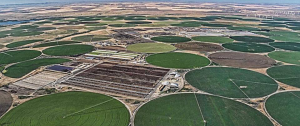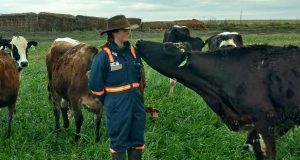Farm Babe: Hey Natalie Portman, here’s why your term ‘factory farm’ is so offensive
| Posted in: Land Sustainability & Stewardship, News
I woke up this morning tagged on some rebuttal tweets to actress NataliePortman where she had railed against “factory” farming and how awful it is. She’s partnered up with some “go vegan” activist groups in New York City to make a new anti-meat movie. In it, she talks about the efficient “steel masterpieces” of agricultural facilities that increase production, while also claiming that they are designed to help keep the operation secret from the public.
Sigh. We in agriculture have seen this all too many times. Farmers make up less than 2 percent of the population, and our voices are so easily drowned out by media sensationalism. A Hollywood celebrity or vegan from NYC are the absolute last source of info we should go to for information on livestock farming. Do you ask your dentist for mechanical advice about your car? Do you ask your automechanic to fix your teeth? It’s so important to ask real experts about their respected careers and always go to the source. I wouldn’t tell Portman how to be a good actress … it’s not my realm of career expertise. So why should Portman get free rein to do that to us?
Myths on “factory farming” have been swirling for years. Some people removed from animal agriculture may believe that livestock are raised in cruel, cramped conditions; perhaps they’ve heard that they’re pumped full of hormones or antibiotics, or they’re abused by blank corporate faces and raised by profit-driven people who don’t care.
These perceptions couldn’t be further from the truth, however I don’t blame some people for believing them. In a day where the average person at least three generations removed from the farm, of course some may fall for farming rumors! Fear sells, and most are not aware of the “money trail” behind the anti-animal agriculture movement and how catchy videos are used to generate revenue and not usually used to help animals. If they really care about helping animals, why do they continue to let the cameras roll when they see something they claim to be abuse? The better that farmers treat livestock, the better they treat us — and 99 percent of farms are family owned. Farming pages like Tillamook Dairy Farmerand Threemile Canyon Farm do a great job of showcasing their awesome “factory” farms.

Both of these images come from the same farm, yet the top one could portray an image of scale and uncertainty and the bottom one could portray care and compassion. A farm should never be judged by its cover. (Images courtesy of Threemile Canyon Farms)

I am guilty of once believing the myths — and I had spent way too much money on groceries. But now that I’m actually a farmer and tour large-scale farms on a regular basis, my eyes have been so opened. Larger-scale farms oftentimes can afford the latest and greatest technology. They have the tightest regulations and can afford to have employees that are on call 24/7 and have on-site veterinarians. These farms may have Ph.D.s on staff who are experts in dairy science, poultry science, etc. Contrary to popular belief and outdated info, livestock are not routinely “pumped full” of hormones and antibiotics, and I recommend everyone track down a large-scale farmer and take a tour for themselves to learn the real truth, straight from the farmer’s mouth. (Routine use of antibiotics was more commonplace in prior decades, before the Veterinary Feed Directive was put into place last year by the FDA regs.) Science has improved every aspect of our lives, and farming is no exception; it has improved leaps and bounds.
These experts are keeping the rapidly growing global population well fed. Agriculture is an “industrial” size business with tight regulations and a massive amount of food safety rules in place. IPhones are not exactly made in someone’s basement, yet I don’t hear anyone railing against “big cell phone,” probably because it doesn’t sell a competing product and there are no activist groups to push an “anti cell phone” agenda for fundraising.
Now, don’t get me wrong. The system’s not perfect by any means, and the government takes its fair share from the farmer. I am a huge fan of the buy localmovement and encourage people to “shop small” in their communities. Even for myself, I sell at farmers markets and understand firsthand how difficult it can be with overhead costs, paperwork, regulations, and excessive government red tape. So, if you can, buy direct from your local farm! They certainly appreciate it more than you know and probably do a “happy dance” every time you support their families direct, while the cashier at Walmart probably doesn’t care that you bought something from a large corporation. Knowing where your food came from and seeing how it’s raised is rewarding, both from the farmer and consumer perspective alike. And it’s cool to learn about!
Our farm is “medium sized” I’d say. A few hundred livestock, not a CAFO (concentrated animal feeding operation). So, by defending them I’m not saying small or medium is bad nor am I sharing a bias; just encouraging people to take a deeper look at how they’re raised. Social media is a great resource to connect to “factory” (aka family) farms and learn that big certainly doesn’t mean bad! When reaching out to these farmers on social media, I realized many of them want to remain anonymous for fear of the “go vegan” animal-rights extremists. It is sad that the activist voices have gotten louder because their “truth” is not reality. They’re the furthest removed and have never worked on a farm a day in their lives. Laws have been put into place to protect farmers from them, and it seems as though getting on a farm is sometimes harder than getting into the hottest clubs in Hollywood!
From firsthand experience it’s not because farmers have anything to hide, it’s just the fear brought forth from activist groups that have made them scared to tell their stories. Too often we hear about farms being raided by activists and animals being stolen or vandalism taking place. America’s farmers work where they live and have to protect their families, and so many words can be twisted to suit an agenda. There are biosecurity efforts to prevent disease and systems in place to protect their well being. These are family farmers who are parents, grandparents, and human beings who care just like you and me. They’re not faceless corporations, they’re real people who care about these animals every day.
Guys, enough is enough. The term “factory farm” originally came about in the ‘70s to make farmers sound more business-like. After all, factories are places with quality assurance and systems in place to make businesses more efficient and profitable with properly trained employees to make a quality product. Since then, activists have hijacked the term. We have to do a better job of speaking up and take back the narrative. When I travel to different conferences and speak with executives in our industry I’m always saying the same thing: We need to get celebrities on real working farms. We have to stop being afraid. Larger scale farms need to open their barn doors in a fun, humorous, and interesting mainstream way. Any rancher or farmer can do a great job raising livestock efficiently and humanely, regardless of size, marketing tactic, or label.
Michelle Miller, the Farm Babe, is an Iowa-based farmer, public speaker, and writer, who lives and works with her boyfriend on their farm, which consists of row crops, beef cattle, and sheep. She believes education is key in bridging the gap between farmers and consumers.
